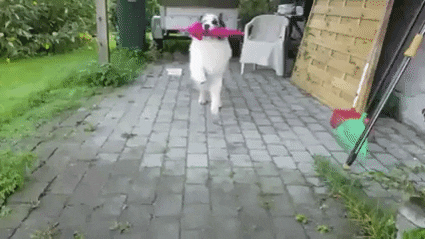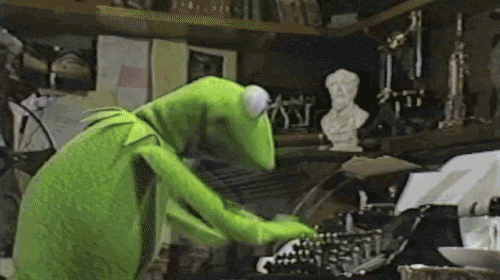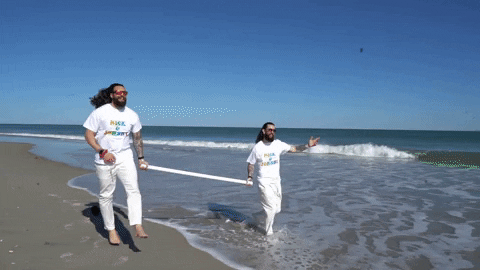⏩ The Excellent Case for Skipping Ahead!
Why plod when you can skip?
Well, hello there, writer.
When I was in grade school, I didn’t walk very much.

I moved in every way that I could that was NOT a sedate stroll. I floated. I jounced and jumped. I frolicked.
And while some kids were runners, I preferred the perfect motion of the SKIP.
Oh, I skipped so much, loving the sheer speed I could get from that hop-LEAP-hop-LEAP. Skipping was faster than running, mostly because running tangled my feet beneath me like my legs were made of yarn. Running equalled crashing.
But skipping? My yarn legs were made to knit themselves together, a little hop and then a huge leap. Even in my dreams, I still locomote most frequently by skipping.
The other day while having coffee with a friend at the farmer's market, she randomly wondered out loud if I remembered how to skip.
I stared at her, wondering if someone had paid her to ask me this most delightful of questions. "Do I remember how to skip?" Why didn't more people ask me this?
I set my coffee on the picnic table and then skipped toward the water's edge, toward the two children sorting shells. I startled a cluster of seagulls. I turned and skipped back. My friend grinned.
Joy.
Skipping when you write?
Sublime.
Say you're writing along, and you feel a little stuck. Maybe you're just not feeling it. Something's wrong, but you don't know what it is.
You have a few options here.
You can think for a short while and try a new direction or tack.
You can think for a long while and remain stuck in or around that scene for days or weeks.
Or this:
YOU CAN SKIP AHEAD.
Hop-leap, and try something else!
Move into a new scene, dive into another section!
Move toward what you're excited to write.

Wait.
Just abandon the scene you're in? Leave it there flopping on the dock, gasping?
Yep.
You're allowed to stop midscene. Hell, you can quit midsentence if you want to.
If you worry that you won't remember how you want to finish that bit, leave yourself a few notes.
Don't forget to get her out of the tavern with the sack of jewels, make the scene sadder, and somehow figure out a way to connect it to the cave scene.
There! I've left some breadcrumbs for Future Rachael (who will, necessarily, be much smarter about this part of the story once she's written a lot more of the book).
For so long, I thought transitions were meant to be written as I went along.
If I was moving from one scene to another, I thought I needed to lay the connections out for the reader right then and there.
But so often, I didn’t yet know the true connection. Plus I wasn’t even sure what I’d just written made any sense, or whether this scene would end up earning its place in the final book.
Ever the A-student, though, I thought I had to finish scenes. I thought I had to finish sentences!
As if someone were standing behind me, clicking their red pen, ready to pounce.
No one was there, though.
There were exactly zero writing officers waiting to write me tickets or haul me off to jail for my repeat offenses.
I would say that knowing this made me into a scofflaw, but that would imply the existence of laws, and I’m not sure there are any. I’ll always argue that there are best practices in writing, tried and true methods of evoking emotion in the reader, which is, after all, our one true job. But there are no laws that say how we have to pull the strings that are attached to the reader’s heart.
And the way to your draft that will eventually affect someone else—there are no signposts that you don’t make. There is no landscape that you don’t create.
That means you get to do whatever the hell you want, and that includes skipping ahead.
But Rachael, that’ll make my draft so messy.
Your draft is going to be a riotous, gorgeous mess anyway. You can’t help that. If the assignment is fingerpainting, would you rather fingerpaint cleanly with the tip of your little finger? Sure, if you do that, your clothing will stay clean and Mom won’t yell at you when come home from school.
Or, you can accept the smock that the teacher slips over your head. You can spread your fingers wide and press the paint all over them and start joyfully smearing color on your paper.
I have to admit I’m a bit of a hypocrite. I hate getting my hands dirty, and I'd much rather write a clean first draft.
But I can't. (Here's your regular reminder that most of us can't. The only writers who can create a clean first draft are the ones who are both doing that and producing good, publishable books they're proud of. If that's not you, then you're like the 98% of us who have to make messes first.)
What part are you excited to write most?
Go there.
Skip there now.
If it makes you feel better, leave yourself some breadcrumbs to expand in revision, after this draft is done.
Skip ahead to the next bit you can see clearly, to the next part that you can't wait to write. Don't save it until you get through the slog. (Top-Secret Tip: The slogging parts are usually the parts you have to cut later, anyway, even if you can't imagine that while first drafting. Your brain is SO smart, and already knows that, somehow.)

Skip!
Hop-leap!
Spin!
Cavort!
Abandon the ship you're on, and leap to the little rowboat waiting below. Splash your way to the next ship, or the island that looks like it's probably full of sweet, frosty drinks and exuberant, friendly monkeys.
You're allowed, because YOU make the rules.
You've got this.
Onward!
Rachael
Website | Facebook | Instagram | Podcast | Patreon
PS - It would be mighty helpful to me if you'd share this with a kind writing friend? You can forward this to them, and they can join HERE.
PPS - I've been loving THE BEACH! I know it's cold up in the northern hemisphere, but it's been lovely down here. Swimming after work = swoon.

More on Instagram.
Add a comment: